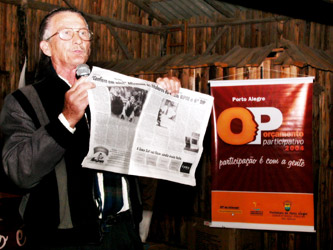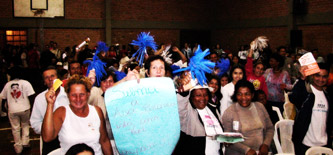Participatory Budgeting
Presentation
In many countries, planning and executing public budgets involve waste and come up against difficulties due to power concentration. For decades, Brazil experienced high inflation rates, which made budget management and control difficult.
A change in this historical trend occurred in 1989, when the city of Porto Alegre, capital of the state of Rio Grande do Sul, with a population of 1.4 million inhabitants, elected Olívio Dutra as mayor. He and his team decided to set up a new mechanism for municipal administration, called “orçamento participativo”, participatory budgeting, based on social justice and the inclusion of social classes that had, until then, been excluded from representation. 
It was felt that popular participation would be the most democratic way of consolidating a model of participatory democracy in the city, in which society could express itself to the full. Large-scale public works were made possible by sound financial policies supervised by the population, which earned the government broad negotiation capacity and credibility with financial institutions. In fact, all action was accompanied by careful planning and popular deliberation.
The city was modernized through large and small-scale public works in sanitation, roads and transportation, which, together with new social and economic development policies, were of fundamental importance in establishing Porto Alegre as the city with the best quality of life index and the best transport system in the country, with recognised environmental policies and excellent opportunities for investment.
Participatory budgeting was an innovatory form of direct participation by the people in formulating and implementing budget policies in the city. Participatory budgeting brought democracy to decisions on how the city’s public resources were used. In the following years, this innovatory experience of participatory budgeting led to the creation of other channels of popular participation such as forums, councils, committees, and conferences. Porto Alegre came to be known as the Capital of Democracy.
People take part in discussions to define budget proposals and have a say in how it is implemented. Participatory budgeting is a means of social inclusion, strengthening the power of the people and providing a more equal use of resources. 
Participatory budgeting in Porto Alegre has gone through many operational and structural changes since it was first introduced, due to a dynamic process in which three characteristics are fundamental: the city is divided into geographical areas, administrative centres are established to bring the people closer to the government, and action is grouped around major “priority issues”. In operational terms, participatory budgeting involves various “rounds of public meetings” spread throughout the year. The aim is to establish a participatory budget, which is then used to formulate the municipal budget.
This experience is an example of democratic administration at the local level and has been adopted by more than 100 Brazilian municipalities, and many others throughout the world. In 1996, Porto Alegre’s “participatory budget” process was selected by Habitat II of the United Nations as one of the 40 best innovatory experiences.
DOWNLOAD THE BROCHURE PDF
portuguese (0.8 MB)english (1.0 MB)
spanish (1.0 MB)
ONLY TEXT
•Participatory Budgeting in practice








 COUNTRY OF ORIGIN
COUNTRY OF ORIGIN